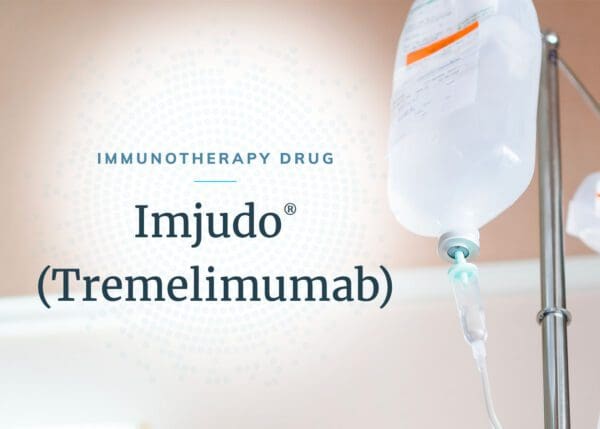01. What Is Imjudo?
What Is Imjudo (Tremelimumab)?
Imjudo® (tremelimumab) is a checkpoint inhibitor, which is a type of immunotherapy drug. It uses the patient’s immune system to recognize and attack cancer cells. Other checkpoint inhibitors similar to Imjudo have shown encouraging results in treating mesothelioma. This makes Imjudo a possible area of interest for future mesothelioma research.
Immunotherapy is a promising type of emerging treatment for mesothelioma. The United States Food and Drug Administration (FDA) has not approved Imjudo to treat mesothelioma yet. However, it received approval in late 2022 to treat non-small cell lung cancer (NSCLC) and unresectable (inoperable) hepatocellular carcinoma in conjunction with other drugs.
Research into the effectiveness of different immunotherapy drugs for mesothelioma is ongoing. The FDA has approved the immunotherapy combination of Yervoy® (ipilimumab) and Opdivo® (nivolumab) to treat some cases of pleural mesothelioma. Yervoy and Opdivo are both checkpoint inhibitors. They use similar mechanisms to Imjudo to support cancer-fighting activity.
Mesothelioma patients may start receiving Imjudo if it is proven to be a safe and effective treatment.
02. Imjudo and Mesothelioma
How Does Imjudo (Tremelimumab) Treat Mesothelioma?
Imjudo is an immunotherapy drug that may help the immune system engage in cancer-fighting activity. Imjudo is a checkpoint inhibitor, which is a type of monoclonal antibody treatment. Early studies point to its possible benefits as a mesothelioma treatment.
Imjudo may help the body’s immune system detect and destroy cancer cells. It can do this by interfering with immune checkpoints that help cancer cells avoid being attacked by the immune system.
T cells are immune cells that can recognize and attack harmful cells or materials in the body. Immune checkpoints are safeguards that help keep T cells from attacking healthy cells. But cancer cells can also use immune checkpoints to avoid T cell attacks.
Checkpoint inhibitors block immune checkpoints, allowing T cells to recognize and attack cancer cells. Imjudo interferes with an immune checkpoint called CTLA-4. This interference prevents cancer cells from using this checkpoint to avoid detection and destruction by T cells.
Early research indicates Imjudo combined with Imfinzi may help treat mesothelioma. Imfinzi is another checkpoint inhibitor. It targets a different checkpoint (called PD-1/PD-L1) than Imjudo. In combination, Imjudo and Imfinzi target the same checkpoints as Yervoy and Opdivo. The FDA has approved Yervoy plus Opdivo to treat malignant pleural mesothelioma. Researchers hope to find comparable treatment benefits with Imjudo plus Imfinzi.
Resources for Mesothelioma Patients
03. What to Expect
What to Expect During Treatment
There is no standard mesothelioma treatment with Imjudo. Researchers have yet to fully explore its possible mesothelioma treatment applications. It is still considered an experimental therapy for mesothelioma.
Researchers have tested Imjudo in at least one mesothelioma study. Study patients had inoperable pleural or peritoneal mesothelioma. They received Imjudo in combination with Imfinzi. Both drugs were administered through intravenous injection.
Patients in this mesothelioma study received treatment in two or three phases:
- Phase 1: This phase used both Imjudo and Imfinzi. Patients received this infusion every four weeks for four cycles of treatment.
- Phase 2: This phase used only Imfinzi as a form of maintenance therapy. This phase lasted for nine four-week cycles.
- Phase 3 (for relapsed patients): Some study patients relapsed during the second phase. They were given the option to restart phase one if they were still eligible to receive Imjudo plus Imfinzi.
Future studies may explore different ways to use Imjudo for mesothelioma treatment.
Preparing for Your Appointment
Patients can prepare for their immunotherapy appointment. For example, actions they may take that may support immune function include:
- Eating well: Good diet and nutrition may help maintain energy needed for treatment. Doctors may recommend patients avoid drinking alcohol.
- Exercising: Staying active may have positive effects on the immune system.
- Sleeping well: Good sleeping habits may help boost the immune system.
Patients may also want to arrange transportation from the treatment center. This is especially important for the first appointment, as patients may not know how the treatment will affect them. Transportation services may be available if a friend or family member cannot provide a ride.
Treatment with immune checkpoint inhibitors commonly requires less preparation than chemotherapy. This is because checkpoint inhibitors are generally less toxic and easier to administer. Certain chemotherapy pretreatment preparations, such as intravenous hydration, may not be necessary. Checkpoint inhibitors also do not involve having a surgically implanted port. A port is a disk where chemotherapy drugs are injected into the body.
Cancer centers may have their own preparation guidelines for patients receiving checkpoint inhibitors. A healthcare provider can walk patients through any guidelines. They can also answer any other questions patients have about appointment preparation.
04. Benefits of Imjudo
Imjudo (Tremelimumab) Benefits
Researchers are still looking into the potential benefits of mesothelioma treatment with Imjudo. Early research has yielded some positive results. Future studies could help establish a useful treatment regimen using this immunotherapy drug.
One existing study showed the potential benefit of Imjudo as a second-line treatment for mesothelioma. All study patients received several cycles of Imjudo and Imfinzi. This was followed by maintenance therapy with only Imfinzi.
Some patients then underwent repeat treatment with Imjudo and Imfinzi. Patients ineligible for repeat treatment received chemotherapy. Patients who underwent repeat treatment experienced improved survival. Median overall survival (MOS) was significantly different between the repeat treatment and the chemotherapy groups.
- MOS in the chemotherapy group: 11 months
- MOS in the Imjudo and Imfinzi re-treatment group: 26 months
These results show a notable improvement over earlier studies on second-line mesothelioma treatment. Historical second-line treatments for pleural mesothelioma achieved a survival of about eight months. Although this is only one study, the results are encouraging. Future research may show improved survival for mesothelioma patients who receive similar treatment.
05. Side Effects of Imjudo
Imjudo (Tremelimumab) Side Effects
Patients receiving Imjudo for malignant mesothelioma may experience side effects. Treatment side effects in patients who received only Imjudo are not well documented in mesothelioma patients. Possible effects from a combination of Imjudo and Imfinzi are listed below.
Patients treated with Imjudo and Imfinzi may also experience immune-related adverse events (irAEs). This is a type of side effect that resembles an autoimmune flare-up. In one study, 75% of patients receiving both drugs experienced some kind of irAE. irAEs happen when a patient’s immune system attacks healthy tissue. This type of reaction can be serious. Doctors can watch for signs of irAEs during treatment.
Managing Side Effects
Imjudo is still an experimental drug for mesothelioma treatment. As such, its side effects and their management are not well documented for these patients.
One study noted side effects from treatment with Imjudo and Imfinzi. It found side effects to be generally manageable and reversible. Some study patients discontinued treatment because of irAEs. These patients also received treatment for their irAEs. Side effect treatment included:
- Growth factors
- Immunoglobulins
- Steroids
These interventions resulted in the resolution of patients’ adverse events. Mesothelioma doctors may look to manage side effects by pausing treatment.
Patients should speak to their healthcare team about any side effects they experience. A mesothelioma doctor can determine how to best address side effects.
06. Imjudo Eligibility
Who Is Eligible for Imjudo (Tremelimumab)?
Imjudo is not currently approved to treat mesothelioma. It is unclear which mesothelioma patient characteristics may or may not make a person eligible to receive this immunotherapy drug. Future research can help determine Imjudo eligibility requirements.
Clinical trials with Imjudo may have their own eligibility requirements. In one study combining Imjudo and Imfinzi, eligibility requirements included:
- Adequate ability to engage in daily activity, also called performance status
- Adequate organ function
- Life expectancy of at least 3 months
Patients deemed ineligible to participate in the study included those with:
- Autoimmune disease
- Brain metastases
- Previous checkpoint inhibitor treatment targeting the same immune checkpoints
These requirements will not necessarily be the same for every clinical trial.
07. Imjudo Studies
Clinical Trials and Studies on Imjudo (Tremelimumab) for Cancer Treatment
Imjudo has been approved to treat two types of cancer: unresectable hepatocellular carcinoma and non-small cell lung cancer. Studies into other possible uses are ongoing. In general, immunotherapy is a promising type of mesothelioma treatment. Immunotherapy drugs have the potential to improve mesothelioma prognosis.
One clinical trial looked at the potential use of Imjudo alone to treat relapsed mesothelioma. Overall survival for patients receiving Imjudo did not differ from those who received a placebo.
One study achieved positive survival results for mesothelioma patients using Imjudo and Imfinzi. The study initially enrolled 40 patients with pleural or peritoneal mesothelioma. Some study patients had already received first-line treatment with chemotherapy.
Patients first went through several cycles of Imjudo and Imfinzi infusions. They then received maintenance treatment with Imfinzi. Ultimately, 17 patients underwent retreatment with Imjudo and Imfinzi. Other patients who did not qualify for retreatment received chemotherapy.
Retreatment patients had an overall median survival more than twice as long as chemotherapy patients. These results are an improvement over earlier studies on second-line mesothelioma treatment.
Research into checkpoint inhibitors for mesothelioma is a developing area of study. Future research may create sufficient evidence to warrant FDA approval for tremelimumab to treat mesothelioma.












